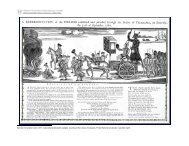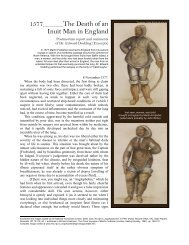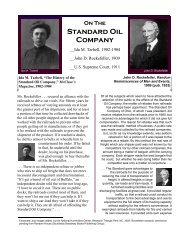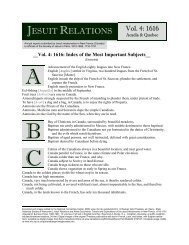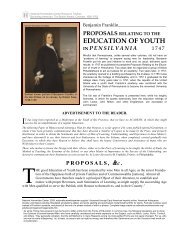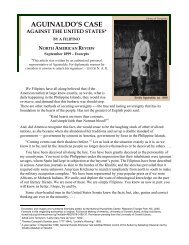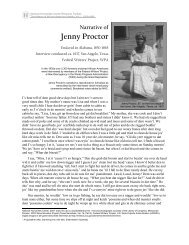Britain's Defeat in the American Revolution: Four British Cartoons ...
Britain's Defeat in the American Revolution: Four British Cartoons ...
Britain's Defeat in the American Revolution: Four British Cartoons ...
You also want an ePaper? Increase the reach of your titles
YUMPU automatically turns print PDFs into web optimized ePapers that Google loves.
National Humanities Center Resource Toolbox<br />
Mak<strong>in</strong>g <strong>the</strong> <strong>Revolution</strong>: America, 1763-1791<br />
__BRITAIN’S DEFEAT IN THE AMERICAN REVOLUTION: FOUR BRITISH CARTOONS, 1782__<br />
*<br />
The rattlesnake as a symbol of <strong>the</strong> <strong>American</strong> colonies orig<strong>in</strong>ated with Benjam<strong>in</strong> Frankl<strong>in</strong>’s Jo<strong>in</strong> or Die cartoon of 1754, which he pr<strong>in</strong>ted above his<br />
newspaper essay urg<strong>in</strong>g unity among <strong>the</strong> colonies for defense aga<strong>in</strong>st <strong>the</strong> French and Indians on <strong>the</strong> frontier. So <strong>in</strong> 1782, as Brita<strong>in</strong> was reel<strong>in</strong>g<br />
from defeat and maneuver<strong>in</strong>g through treaty negotiations with <strong>the</strong> U.S. and its allies, English cartoonists relished portray<strong>in</strong>g <strong>the</strong> U.S. as a vengeful<br />
and menac<strong>in</strong>g rattlesnake. Europeans had long been fasc<strong>in</strong>ated by accounts of <strong>the</strong> rattlesnake’s threat and prowess⎯which translated <strong>in</strong>to<br />
“deceitful foe”⎯and yet <strong>the</strong> cartoonists’ awe of <strong>the</strong> coiled muscular reptile is evident. The<br />
United States was a power to contend with, period, and <strong>the</strong> standard symbol of an Indian<br />
pr<strong>in</strong>cess for America was no longer apt.<br />
The <strong>American</strong> Rattle Snake, London, 12 April 1782<br />
Paradice Lost [sic], London, 10 May 1782<br />
Rarely pr<strong>in</strong>ted <strong>in</strong> newspapers at <strong>the</strong><br />
time, political cartoons were usually<br />
published by pr<strong>in</strong>tmakers as large<br />
etch<strong>in</strong>gs⎯<strong>the</strong> four <strong>in</strong> this selection<br />
average 9 x 13½ <strong>in</strong>ches. They were<br />
called satires or caricatures; <strong>the</strong><br />
term cartoon was not commonly<br />
applied to such illustrations until <strong>the</strong><br />
mid 1800s. What impressions do<br />
<strong>the</strong> cartoonists give of <strong>the</strong> U.S. and<br />
Brita<strong>in</strong> <strong>in</strong> <strong>the</strong>se satires? How do<br />
<strong>the</strong>y characterize <strong>the</strong> nations’ new<br />
relationship <strong>in</strong> 1782? How do <strong>the</strong>y<br />
acknowledge that <strong>the</strong> U.S. is, <strong>in</strong>deed,<br />
a nation among nations?<br />
Frankl<strong>in</strong>’s cartoon <strong>in</strong> his Philadelphia<br />
Gazette, 9 May 1754<br />
The <strong>British</strong> Lion engag<strong>in</strong>g <strong>Four</strong> Powers, London, 14 June 1782<br />
The <strong>American</strong> Rattlesnake present<strong>in</strong>g Monsieur<br />
his Ally a Dish of Frogs, London, 8 November 1782<br />
* National Humanities Center, 2010: nationalhumanitiescenter.org/pds/. Images courtesy of <strong>the</strong> Library of Congress, Pr<strong>in</strong>ts and Photographs Division, <strong>British</strong> Cartoon Pr<strong>in</strong>ts Collection.
__BRITAIN’S DEFEAT IN THE AMERICAN REVOLUTION: FOUR BRITISH CARTOONS, 1782__ __<br />
With<strong>in</strong> two coils of <strong>the</strong> snake are<br />
surrender<strong>in</strong>g troops of <strong>the</strong> <strong>British</strong><br />
army under Generals Cornwallis<br />
and Burgoyne at Yorktown, Virg<strong>in</strong>ia,<br />
on October 18, 1781.<br />
Sign hang<strong>in</strong>g on snake’s tail: “An<br />
Apartment to lett for Military Gentlemen.”<br />
Snake tongue: “Two <strong>British</strong> Armies I<br />
have thus Burgoyn’d, / And room for<br />
more I’ve got beh<strong>in</strong>d.”<br />
L<strong>in</strong>es at bottom:<br />
Britons with<strong>in</strong> <strong>the</strong> Yankeean Pla<strong>in</strong>s,<br />
M<strong>in</strong>d how ye March & Trench,<br />
The Serpent <strong>in</strong> <strong>the</strong> Congress reigns,<br />
As well as <strong>in</strong> <strong>the</strong> French.<br />
Well-known cartoon by Benjam<strong>in</strong> Frankl<strong>in</strong><br />
published <strong>in</strong> <strong>the</strong> Pennsylvania Gazette<br />
on May 9, 1754, accompany<strong>in</strong>g his essay<br />
urg<strong>in</strong>g united action aga<strong>in</strong>st <strong>the</strong> French<br />
and <strong>the</strong> Indians on <strong>the</strong> frontier.<br />
The The <strong>American</strong> <strong>American</strong> Rattle Rattle Snake, etch<strong>in</strong>g attributed to James Gillray, London, 12 April 1782<br />
8 ½ x 12 ½ <strong>in</strong>. Library of Congress: LC-DIG-ppmsca-23664.<br />
National Humanities Center Brita<strong>in</strong>’s <strong>Defeat</strong> <strong>in</strong> <strong>the</strong> <strong>American</strong> <strong>Revolution</strong>: <strong>Four</strong> <strong>British</strong> <strong>Cartoons</strong>, 1782 2
___BRITAIN’S DEFEAT IN THE AMERICAN REVOLUTION: FOUR BRITISH CARTOONS, 1782__<br />
<strong>Four</strong> <strong>British</strong> cab<strong>in</strong>et officials*<br />
who had led Brita<strong>in</strong><br />
<strong>in</strong> <strong>the</strong> revolutionary period<br />
are driven out by Charles<br />
Fox, a leader <strong>in</strong> <strong>the</strong> new<br />
cab<strong>in</strong>et organized after<br />
Parliament voted <strong>in</strong> March<br />
1782 to negotiate peace<br />
with <strong>the</strong> U.S. (a failed<br />
attempt).<br />
The “<strong>American</strong> rattlesnake”<br />
looks on defiantly<br />
as <strong>the</strong> deposed <strong>British</strong><br />
leaders are driven out of<br />
<strong>the</strong> “Garden of Eden,”<br />
leav<strong>in</strong>g beh<strong>in</strong>d <strong>the</strong>ir powerful<br />
years at <strong>the</strong> nation’s<br />
helm.<br />
The cartoon alludes to <strong>the</strong><br />
1667 epic poem Paradise<br />
Lost by John Milton, <strong>in</strong><br />
which God drives Adam<br />
and Eve out of <strong>the</strong> Garden<br />
of Eden after <strong>the</strong>y<br />
succumb to <strong>the</strong> serpent’s<br />
temptations to eat fruit<br />
from <strong>the</strong> Tree of Knowledge<br />
of Good and Evil.<br />
* P.M. (Prime M<strong>in</strong>ister) Lord Bute<br />
(1762-63, at far right <strong>in</strong> Scottish<br />
garb), P.M. Lord North (1770-82,<br />
second from right), and probably<br />
Lord Sandwich (First Lord of <strong>the</strong><br />
Admiralty, 1771-82, second from<br />
left), and P.M. Lord Shelburne<br />
(1782-83) or Lord Germa<strong>in</strong><br />
(Secy. of State for <strong>the</strong> <strong>American</strong><br />
Dept., 1776-82). [The <strong>American</strong><br />
<strong>Revolution</strong> <strong>in</strong> Draw<strong>in</strong>gs and<br />
Pr<strong>in</strong>ts, ed. D. H. Cresswell, (Library<br />
of Congress, 1975), p. 352]<br />
Paradice Paradice Lost, etch<strong>in</strong>g, London, 10 May 1782<br />
9 x 13¼ <strong>in</strong>. Library of Congress: LC-USZ62-45475.<br />
National Humanities Center Brita<strong>in</strong>’s <strong>Defeat</strong> <strong>in</strong> <strong>the</strong> <strong>American</strong> <strong>Revolution</strong>: <strong>Four</strong> <strong>British</strong> <strong>Cartoons</strong>, 1782 3
__BRITAIN’S DEFEAT IN THE AMERICAN REVOLUTION: FOUR BRITISH CARTOONS, 1782__<br />
Allies<br />
The The <strong>British</strong> <strong>British</strong> Lion Lion Engag<strong>in</strong>g Engag<strong>in</strong>g <strong>Four</strong> <strong>Four</strong> Powers, Powers, etch<strong>in</strong>g, London, 14 June 1782<br />
9 x 14½ <strong>in</strong>. Library of Congress: LC-USZ62-1533.<br />
Lion: Great Brita<strong>in</strong> “You shall all have an old English drubb<strong>in</strong>g to make you quiet.”<br />
Fox (right): Charles Fox* “I counsel your Majesty to give Monsieur <strong>the</strong> first gripe.”<br />
Spaniel (top): Spa<strong>in</strong> “I will have Gibraltar, that I may be K<strong>in</strong>g of all Spa<strong>in</strong>.”<br />
Rooster: France “I will have my Title from you and be call’d K<strong>in</strong>g of France.<br />
Rattlesnake: United States “I will have America and be Independent.”<br />
Pug dog: Holland “I will be Jack of all sides as I have always been.”<br />
* Influential <strong>British</strong> statesman who opposed George III and supported <strong>American</strong> <strong>in</strong>dependence; held <strong>the</strong><br />
post of Foreign Secretary at <strong>the</strong> time of this cartoon.<br />
Verse at bottom:<br />
Behold <strong>the</strong> Dutch and Spanish Currs,<br />
Perfidious Gallus [France] <strong>in</strong> his Spurs,<br />
And Rattlesnake with head upright<br />
The <strong>British</strong> Lion jo<strong>in</strong> to fight;<br />
He scorns <strong>the</strong> Bark, <strong>the</strong> Hiss, <strong>the</strong> Crow,<br />
That he’s a Lion soon <strong>the</strong>y’ll know.<br />
National Humanities Center Brita<strong>in</strong>’s <strong>Defeat</strong> <strong>in</strong> <strong>the</strong> <strong>American</strong> <strong>Revolution</strong>: <strong>Four</strong> <strong>British</strong> <strong>Cartoons</strong>, 1782 4
__BRITAIN’S DEFEAT IN THE AMERICAN REVOLUTION: FOUR BRITISH CARTOONS, 1782__<br />
The <strong>American</strong> Rattlesnake present<strong>in</strong>g Monsieur his Ally a Dish of Frogs, etch<strong>in</strong>g, London, 8 November 1782<br />
The <strong>American</strong> Rattlesnake:<br />
United States.<br />
Monsieur [mister] his Ally:<br />
France.<br />
U.S. to France, present<strong>in</strong>g a<br />
barrel of frogs: “Monsieur, be<br />
pleas’d to accept <strong>the</strong> Frogs / I<br />
just have kill’d <strong>the</strong>m <strong>in</strong> <strong>the</strong><br />
Bogs.”*<br />
France to US: “I give you<br />
thanks, my good Ally, / Some<br />
will make soup, <strong>the</strong> rest a<br />
Fry.”<br />
Bogs (at left): “A Fish pond<br />
for Frenchmen.”<br />
Verse at right:<br />
O Britons be wise<br />
And part <strong>the</strong>se Allies<br />
Or drive <strong>the</strong>m both<br />
<strong>in</strong>to <strong>the</strong> Bogs;<br />
I th<strong>in</strong>k it is fit<br />
They both should submit<br />
To Old England, or live<br />
upon Frogs.<br />
* Frogs, frog-eaters: derogatory terms<br />
for <strong>the</strong> French s<strong>in</strong>ce <strong>the</strong> late Middle<br />
Ages <strong>in</strong> Europe and later <strong>in</strong> colonial<br />
America and <strong>the</strong> U.S.<br />
9¾ x 14½ <strong>in</strong>. Library of Congress: LC-USZ62-1536.<br />
Statement (bottom right): “N.B. [Nota Bene: note well] The Rattlesnake is a Character chosen by America.”<br />
National Humanities Center Brita<strong>in</strong>’s <strong>Defeat</strong> <strong>in</strong> <strong>the</strong> <strong>American</strong> <strong>Revolution</strong>: <strong>Four</strong> <strong>British</strong> <strong>Cartoons</strong>, 1782 5


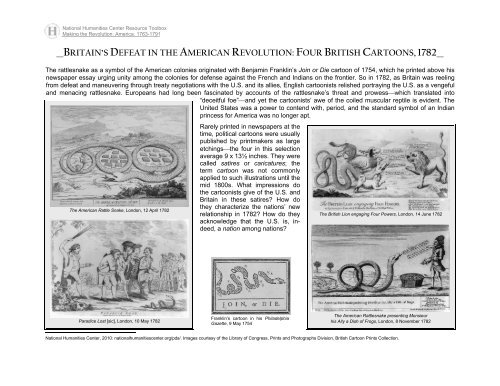
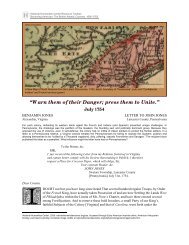
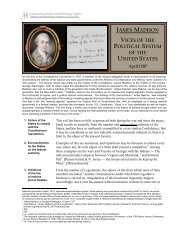
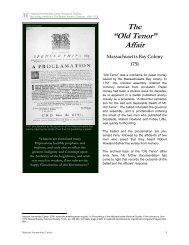
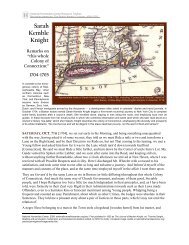
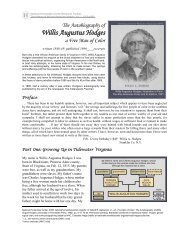
![The Requerimiento [Requirement], Council of Castile, 1510 ...](https://img.yumpu.com/21979685/1/190x245/the-requerimiento-requirement-council-of-castile-1510-.jpg?quality=85)
